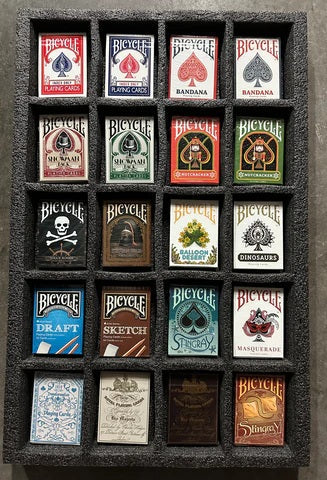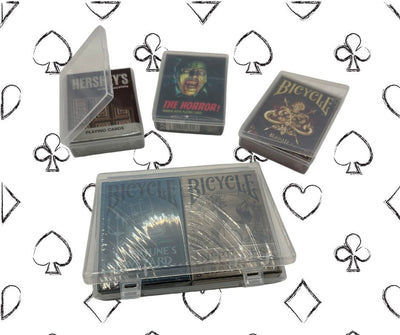(Above is the set up for a game of Ninety-Nine.)
Card Game Rules
Ninety-Nine is a classic card game for 2 or more players. It requires a standard 52 playing card deck and is suitable for ages 8 and up. The objective of Ninety-Nine is to avoid being the player that makes the discard pile have a value over 99.
For more classic games, check out our guides for Bingo and Snip Snap Snorem.
If you are looking for cards to play Ninety-Nine with, check out a standard deck here or one of our newest arrivals here.
Set Up
To set up a game of Ninety-Nine, players need to sit in a circle around a stable playing area. Before gameplay can begin, every player must draw a card from a shuffled deck. The player with the highest card becomes the first dealer. Ties are broken by a redraw. The dealer then shuffles the deck and passes out three cards faced down, to each player. The remaining deck forms the stock and is placed in the center of the gameplay area.
Card Values
The following are the card values in the game Ninety-Nine:
How to Play
Starting with the player left of the dealer and going clockwise, players place a card next to the stock to form the discard pile. The value of the discard pile is recorded by everyone. After discarding a card, players replace it with one card from the stock. Play continues until someone has to make the deck value over 99. Players can only pass 99 three time before they are out of the game. The last player in the game becomes the winner.
For more information on Ninety-Nine, check out pagat's article here.
Variations
Players can change up the card values anyway they like to make the game more fun. The following is a list of alternative card values:
Looking for more card games to play? Check out this article:
40+ Great Card Games For All Occasions
About the author: John Taylor is a content writer and freelancer through the company Upwork.com. You may view his freelancing profile here. He has a B. A. in English, with a specialty in technical writing, from Texas A&M University and a M. A. in English from the University of Glasgow. You may view his previous articles about card games here and his LinkedIn profile here.







1 comment
Hello playingcarddecks.com admin, Your posts are always well-supported and evidence-based.